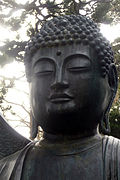Biography
Ama Samy was born to Christian parents in Burma in 1936 and grew up in India. After becoming a Jesuit in 1972, he began visiting Hindu ashrams and Buddhist meditation centers. He was introduced to Ramana Maharshi's teachings by Swami Abhishiktananda. His searching led him to become a wandering beggar for a period and to settle down as a hermit. [5] [3] With the help of Father Hugo Enomiya-Lassalle, he visited Japan and trained with Yamada Koun Roshi of Sanbo Kyodan. In 1982, Yamada Roshi authorized him to teach Zen. [1] [2] [3] He received the Japanese Dharma name Gen'un-ken (Gen: dark, obscure, mystery; Un: cloud). [6]
Ama Samy founded the Bodhi Sangha, the community of his disciples, in 1986. Bodhi Sangha became an independent Zen school when he left the Sanbo Kyodan organization in 2002. [7] [3] [8] Ama Samy's method of teaching embraces both Soto and Rinzai Zen traditions and draws from the resources of Christianity and other religions. [5] He founded two Zen centers near Kodaikanal in South India, Bodhi Zendo (opened in 1996) and Kanzeon Zendo (opened in 2022). He currently lives and teaches at Kanzeon Zendo. [9] Ama Samy is a member of the Society of Jesus. Since his transition to Kanzeon Zendo, however, he considers his relationship to be of a different kind. [4] Since Father Lassalle first invited Ama Samy to join him on a tour of Europe in 1985, Ama Samy has spent several months each year leading retreats in Europe, Australia, and the USA. [5] [3] With the help of his students, he also runs Little Flower, a non-profit organization supporting women, children and landless people in South India. [10]
This page is based on this
Wikipedia article Text is available under the
CC BY-SA 4.0 license; additional terms may apply.
Images, videos and audio are available under their respective licenses.


